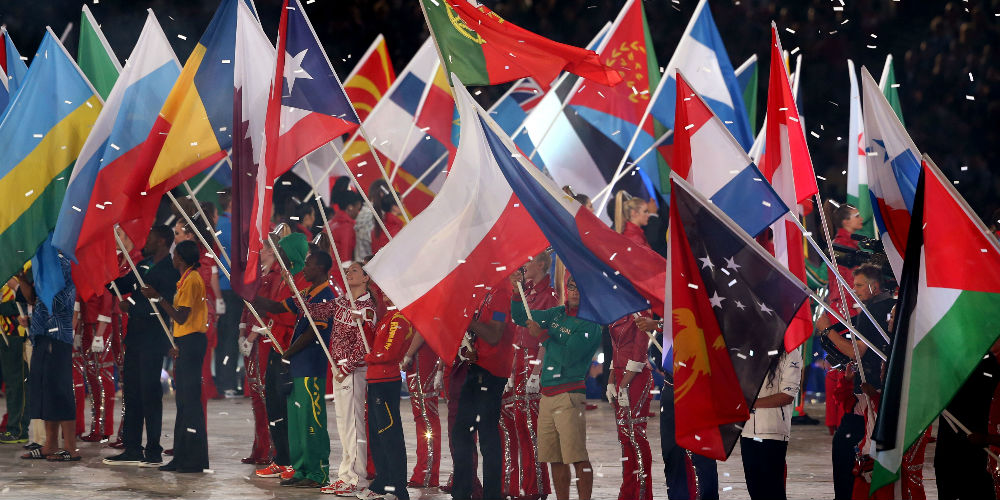Britain basks in Olympic glory, but for how long?

Flag bearers are showered with confetti in the Olympic Stadium during the closing ceremony at the 2012 Summer Olympics, Sunday, Aug. 12, 2012, in London. Britain basked in the feelgood factor of its most successful ever Olympics performance in a Games that it organized to widespread acclaim, but the time to capitalize on it could be short. AP PHOTO/SERGEI GRITS
LONDON—Britain basked Sunday in the feelgood factor of its most successful ever Olympics performance in a Games that it organized to widespread acclaim, but the time to capitalize on it could be short.
When Mo Farah crossed the line on Saturday to complete a remarkable track double of 5,000 meters and 10,000 meters, the 80,000 crowd in the Olympic Stadium in east London roared him down the home straight.
Farah’s second title contributed to Britain’s 29 gold medals with a handful of events remaining, 10 more than it won in Beijing and enough to comfortably rank third in the table behind only the United States and China.
The success has come on the athletics track – if Farah was Britain’s king of the Games then heptathlete Jessica Ennis was its queen – but especially in the velodrome where Britain dominated the competition.
Britain won titles in its other traditional strengths of rowing, sailing and equestrian events but also in sports such as women’s boxing, shooting, canoeing and taekwondo.
Perhaps more important than the medals’ tally has been the way that millions of Britons have embraced the Olympics, packing stadiums and lining the routes of everything from the torch relay to the men’s marathon.
Tickets sold out in record time, and there was anger when empty seats unfilled by team officials appeared at some venues early in the Games.
But even before the closing ceremony took place, the Games’ chief organizer Sebastian Coe warned of the danger of throwing away all the goodwill and impetus built up in the last two weeks.
“It’s a limited window, it’s not something that you are going to be able to continually remind people about once you get two or three years down the track,” Coe told journalists.
“I think these memories will be indelible but the way that you really leverage up to 100,000 to, say, 400,000 more people playing that sport off the back of every medal is clear.
“It takes political energy, predictable levels of funding, we have to ensure that we have school sport alive and kicking and that we have a healthy network of clubs out there… and we do have to make the most of that.”
On Sunday, Prime Minister David Cameron named Coe as “legacy ambassador” for the Games to advise the government “on how best to secure the long-term benefits of hosting the Games, particularly focusing on the economic and business benefits.”
Cameron also announced guaranteed funding for elite sport of £125 million (160 million euros, $196 million) over the next four years to take the team up to the 2016 Olympics in Rio de Janeiro.
Alongside the hoped-for boost for sport, Cameron promised “an economic legacy, with new deals brokered on the back of these Games.”
Cameron would dearly like to capitalize on the feelgood factor as he enters a tricky autumn – once the Olympics and Paralympics have finished, Britain will still be left with an economy in recession and a fragile coalition government.
The prime minister also faces a possible challenge to his authority from the mop-haired mayor of London Boris Johnson, who has by most estimates had a “good Games.”
A member of Cameron’s Conservatives, Johnson has always been considered too eccentric to take the party leader’s job – but he has burnished his image at London 2012, even turning an unfortunate incident on a zipwire to his advantage.
Coe said Beijing was still earning billions of dollars in “consultancy bookings” as a result of hosting the Olympics in 2008, and hopes for the same for Britain.
The reality could be very different.
Australia hosted arguably the best Olympics in history in 2000, yet the predicted boom in tourism after the Games failed to materialize.
To rub salt into the wounds, at the London Olympics, the normally formidable Australian team had won just seven gold medals ahead of the last day of competition.